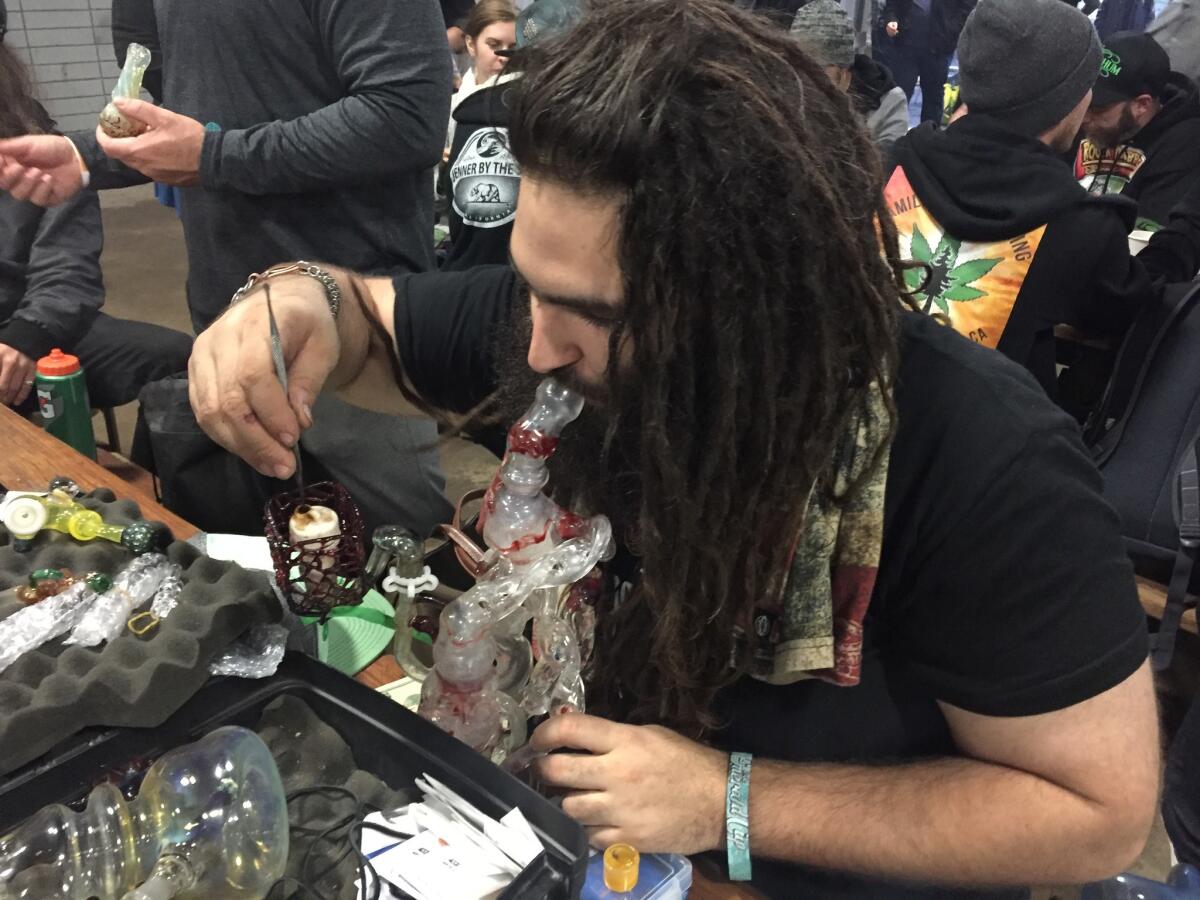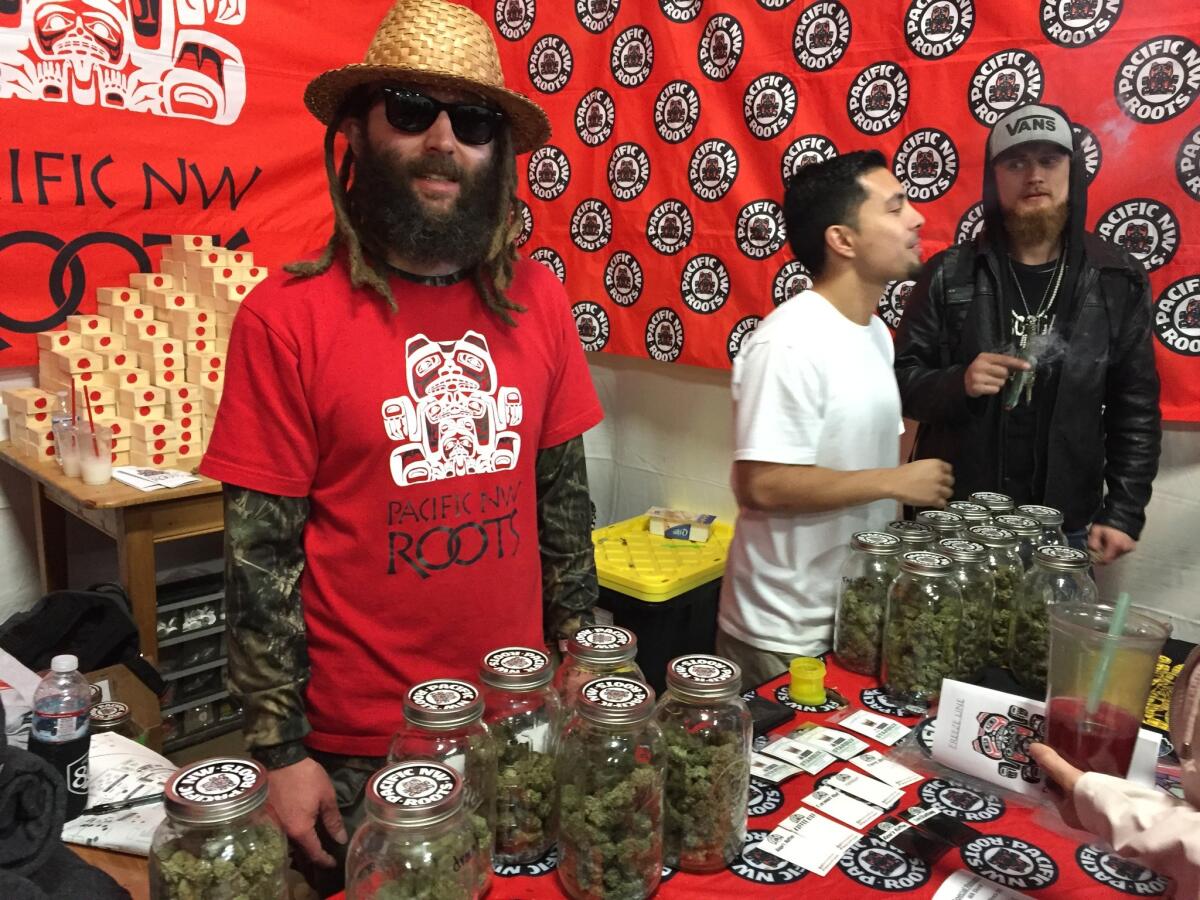Legalization is opening doors for new marijuana entrepreneurs. Are we about to see a pot gold rush?
Reporting from Santa Rosa, CA — Outside a Sonoma County Fairgrounds exhibition hall last weekend, hordes of happy pot lovers walked around the Emerald Cup harvest festival, already stoned or about to be.
Inside the hall, a panel of entirely sober government officials discussed the ramifications of marijuana legalization, California’s complex and evolving regulatory structure, and tried to answer questions about the future of the cannabis industry that seem, at this point, unanswerable.
Will cannabis businesses ever be able to move away from the all-cash model forced upon them by banks unwilling to risk their charters to do business with purveyors of what the feds still classify as a controlled substance? (Hope so, said state Board of Equalization Chairwoman Fiona Ma, who urged them to pay their taxes even if they have to use buckets of cash to do so.)
How will the regulations that were belatedly developed for the 20-year-old medical marijuana industry mesh with regulations for adult recreational marijuana, approved by California voters in November? (Not sure yet, said Lori Ajax, chief of the state’s new Bureau of Medical Cannabis Regulation, who will be untangling that knot.)
Marijuana is now legal in California, but it can still keep you from getting a job »
When and how will marijuana growers be held to tight standards about pesticide residues, which not only taint products but have devastating effects on workers and the environment? (Unclear, said Brian Leahy, director of the California Department of Pesticide Regulation, who added that if cannabis were held to the same stringent standards his department applies to carrots, the industry would probably be shut down.)
Hoping for clarity a few days later, I called Democratic Assemblyman Jim Wood of Healdsburg, who was also on the panel. Wood has the distinction of having written five cannabis-related bills, more than any other California legislator.
Had our lawmakers taken medical marijuana seriously when voters legalized it, he said, we probably would not be facing such confusion today.
But it took them nearly two decades to develop the Medical Cannabis Regulation and Safety Act, a set of bills signed into law last year by Gov. Jerry Brown. They won’t have that luxury with recreational marijuana. The new law requires the state to begin issuing various licenses in January 2018.
“I got into this in January 2015, and there isn’t a day that goes by that I don’t find out something I didn’t know before,” Wood told me. “You could dedicate your entire career to this issue and not get your arms around the entire thing.”
::

Saturday afternoon, I wandered into the sprawling heart of the Emerald Cup, a bustling, fenced-off marketplace open only to those with a medical marijuana recommendation, media included. (Recreational marijuana is now legal to possess, carry and grow, but, unlike medical marijuana, there is no legal way to buy it just yet. This area was purely transactional.)
Most of the cup’s 15,000 or so paying guests, who forked over between $70 and $120 per ticket, spent some time here. They could wander around a cavernous livestock barn filled with herb vendors or poke around across the way, in a huge tent where dozens of edible cannabis makers offered tastes of their wares.
Getting a medical card ahead of time was so easy, it felt transgressive. I had a Skype consultation with a pediatrician. What were my symptoms? I told her I have a lot of anxiety. (Who doesn’t?)
“You don’t look very anxious,” she said.
“Well, I hide it pretty well,” I replied.
A week later, my card arrived in the mail. I never had to leave my house.
Clouds of smoke hung in the air as festival-goers puffed away on flowers or resins or shatter or hash before committing to purchase (or not). Famous cultivators offered top-shelf “genetics” or seeds, some costing as much as $25 apiece.

At nearly every booth, I was offered something free. Pins, stickers, joints. There were trays of infused chocolates for the taking, extract-filled vape pens for the toking. Huge amounts of cash, fueled by strategically placed ATMs, changed hands.
“If those were patients,” Wood said, “there should have been sales tax, and on Monday morning, every vendor should be waltzing down to the Board of Equalization to pay their taxes.” (Yeah … no.)
Not being a pot person, I am always stunned by how much weed people can consume and remain upright. I did see some folks hovering protectively over a woman lying on a bench with her eyes pressed shut. And I overheard one young man say to his friend, “I know I am walking forward, but I keep feeling like I am falling backward.”
::
I met Erin Gore in the edibles tent. She seemed both slightly out of place and symbolic of the new era.
Marijuana is too big an industry to rely on tired stereotypes like dreadlocks, tattoos and flannel shirts, but a certain grunge aesthetic still obtains. Gore, 33, in a black-and-gold sweater set, looked as if she belonged in an executive suite, not at a cannabis confab.
Turns out, she spent 10 years working as an executive for Henkel, a global adhesives business. After discovering that cannabis could help her sleep and deal with the pain of hip surgeries, she became an enthusiast.
“I did a lot of experimenting,” she said. “I smoked, I tried edibles that were way too strong or bad-tasting. I couldn’t find what I wanted — something that was well-sourced, organic, flavorful and low-dose. So I started making my own.”
In April, she quit her job. On Saturday, she debuted Garden Society, her line of cannabis-infused fruit gelées and chocolates. The gelées contain 5 mg of THC, which is considered a very low dose. The chocolates have 10 mgs.
“A lot of times, women over-consume cannabis and it makes us anxious,” she said. “So you want to figure out what your ideal dose is. I am a big, tall woman. My perfect dose is 7.5 mg.”
As I left the Emerald Cup, I crossed the street with a slightly wobbly woman who looked about 25. “Have a good time?” I asked.
“Yes,” she said. “And then the edibles kicked in and I decided it was time to go home.”
Twitter: @AbcarianLAT
ALSO
Proposal to allow roadside testing for marijuana use is revived







